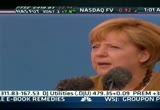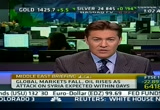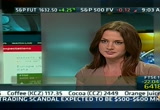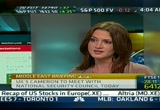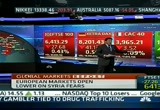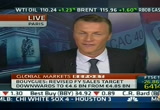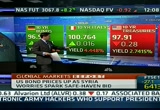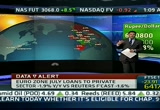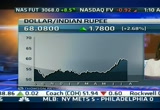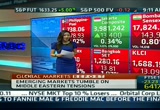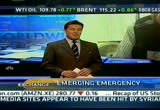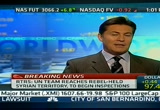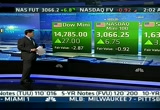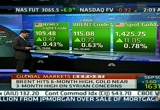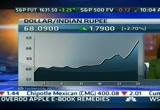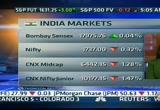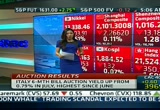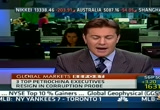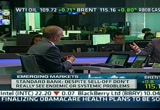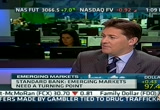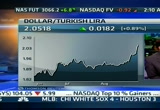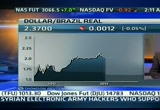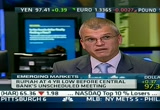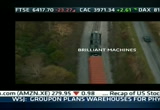tv Worldwide Exchange CNBC August 28, 2013 4:00am-6:01am EDT
4:00 am
you're watching "worldwide exchange." i'm ross westgate. your headlines today. the u.s. and uk governments agree there is no doubt the syrian regime used chemical weapons, raising expectations of a coordinated military response and pushing oil prices to two-year highs. global markets continue to sell off as well on the prospect of further conflict in the middle east. emerging markets hit hardest. india's rupee plunges past 68 to the dollar. weak shares buck the trend. a better than expected second half outlook as its cost cutting plan pays off. and bond investors await answers from mark carney.
4:01 am
the governor is expected to defend forward guidance in his first speech at the helm for at the bank of england. good morning to you. u.n. secretary-general ban ki-moon is delivering a speech from the hague to mark the 100th anniversary of the u.n. peace palace. reports that u.s. and allies are preparing for a potential attack. we'll keep our eyes on that. also coming up on today's show, we'll be out in berlin in a few minutes. we'll hear from a senior met of the social democratic party after angela merkel says greece should never have joined the euro. blamed her spd predecessor gerhard schrader for the mistake. have the gloves come off on the german campaign trail? our latest offering of south korea is an exclusive interview
4:02 am
with ceo of samsung. why they're betting big on wearable technology. and tune in at 10:40, we'll learn how the french government plans to plug a euro deficit. at 11:05 cet we'll set aside some brazil and be joined by a guest who says the country's central bank could hike rates as they struggle with a weakening currency and imported inflation. jpmorgan's list of legal challenges gets longer. we'll get the details from new york at 11:45. all that and plenty more over the next couple of hours. any thoughts or comments, e-mail us, worldwide@cnbc.com. first, speculation is growing that the u.s. and allies will launch a missile strike against syria within days after widespread condemnation from global leaders about the alleged use of chemical weapons by the assad regime. speaking last night, u.s. vice
4:03 am
president joe biden said there was no doubt chemical weapons were used and those responsible should be held accountable. the british prime minister david cameron's office backed the white house earlier today saying both governments had clear evidence the regime carried out the attacks. cameron reconvened parliament early to vote for a motion on syria on thursday, but some surrounding cautious on international intervention. sergey lavrov has reportedly warned the u.n. that an attack on syria would destabilize the region. hadly gamble is with us on set. >> the russians aren't the only ones worried about what a post assad syria would look like. i had a chance to catch up with an egyptian billionaire and he said, yes, he thinks assad's days are numbered but is deeply troubled about what will happen to the country when assad is gone. >> the problem right now is exactly that. we want to help the syrian people to get out of
4:04 am
dictatorship. that is for sure. but under no way fanatic, terroristic elements that operate right now in syria should be given the reins. even the forces go back to normality and understand this is going to be a real democratic, liberal society. we are no less than the west. we deserve to have a real democracy too. and we don't -- we don't deserve to have a taliban type of a government. >> so there you had him talking about the future of syria and he also, of course, is the proponent for secular democracy in egypt. so this is a man who shoots from the hip, tells it like it is and he's just echoing a sentiment i've heard from various arab diplomats on syria at this point. >> yeah. i mean, clearly there is a risk aversion trade at the moment in -- for equity players.
4:05 am
we'll look at that in a second. what is the underlying -- how far do people think this could spread? >> it is interesting if you look at the gulf markets. d dubai fell the most. fell six points today as well. even though the conflict isn't going to escalate into the gulf region, i think people are watching, they're wary. also, the international community is looking at oil prices. >> yeah. we'll keep monitoring, of course what goes on with reactions. we have seen brent this morning up to 114. nymex is pushing higher as well. do you have a sense of what the oil producers are thinking? >> they have to be wary. even in egypt you have the government, they're unable to make payments on -- to the oil producers. and this is going on for now two years, even with the muslim brotherhood in power. so you're seeing this sort of -- the same effect that libya had on the global market. >> okay. hadly, we'll keep our eyes on
4:06 am
that. plenty more to come on syria throughout the program. a lot more analysis as well. right now, though, let's remind you where we stand with our global equities. a risk aversion date. we'll kick off the global markets report, look at the heat map. we're city weighted to the downside once again today. 8 to 2, just about decliners outpacing advancers, maybe more 7 to 2 at the moment as you can see. we're not quite at the lows or the highs for the session either. just over an hour into the trading day. we have had falls yesterday for european equities, preceded a pace again today. ftse 100 at the moment, which did outperform a little bit yesterday, we'll bring it to you. clearly not the ftse 100. there we go. down half a percent, along with xetra dax, cac quarante fairly flat at the moment. over to paris and hear from stephane about that. ftse mib up after underperforming the last two days on concerns. as far as some of the individual stocks are concerned right now, this is where we currently stand.
4:07 am
a call is down 3.22% this morning. the hotel group to the downside on the cac quarante with bouygues which is up 4.66 as well. stephane has the details. stephane? >> we had this morning, ross, a mixed announcement from the unit. it is facing a price war between operators. as a result, the company lowered its sales forecast for this year for the telecom unit. not targeting around 4.6 billion euros, that's to compare with the previous target of 4.85 billion. that was the negative part of the announcement. on the positive side, bouyges announced the second quarter was stronger than expected. the results were down 5%. but it was stronger than consensus. and the group announced this morning an important contract in
4:08 am
hong kong to build a tunnel. 1.15 billion euros, so that's the reason why the stock is performing well today. so that's for bouygues. and accor, its gross operating profit declined by more than 6%. the company says that the booking trend was really positive this summer and it should continue towards the end of the year. that being said, it is targeting for this year a bit weaker than the average forecast and that's the reason why it is one of the worst performers on the cac quarante today. ross? >> stephane, we'll catch up with you later in the program. thank you. bond market, there may be a lot of negative views on fixed income, on bonds and u.s. treasuries, but, of course, the risk aversion has -- the u.s. treasuries yielding 2.47%. 2.67% the yield toward the end of play yesterday.
4:09 am
gilts, looking ahead to mark carney's speech today. italy, 4.44%. another t-bill auction head of btps on thursday. as far as commodities are concerned, we mentioned brent and nymex, where we stand, nymex up to 110 through 109 for first time in a year and a half during the session yesterday. brent up to nearly $116 a barrel. and gold also pushing higher, up to 14.25. copper is the commodity that is falling as we heard from concerns about chinese demand could be wearing on prices until 2016. quick look at foreign exchange markets for you. euro dollar 133.78. dollar yen, 97 handle, not a lot of movement around there. plenty of focus on the rupee. now down to 68 against the dollar. so let's get more on that. we'll update you on the rest of asia. sixuan will join us out of singapore. first, over to sonya who is at cnbc in mumbai.
4:10 am
>> -- all time low that we have seen on the rupee, 68 to the dollar like you mentioned. to put it into perspective, the rupee has lost 14% since the start of august. and has underperformed most of the emerging market currencies. we have seen that emerging markets across the globe have been under pressure because of the high current account -- and emerging markets like indonesia, tokia has. so within the basket, the rupee has seen -- has been at the lowest rung of the latter. many economists and currency experts point out they did not rule out 70 to the dollar as soon as the next couple of weeks as well.
4:11 am
now, you must remember that the twin deficits for the indian economy is something that we have had to deal with for a long time and the situation has only gotten worse after the government went ahead and approved the food security bill, which will put added -- increase the food subsidy bill and put added pressure on the fiscal deficit and may not even reach the target of 4.8% of gdp that the finance ministered lined out earlier. these are the key reasons why the rupee has been under significant pressure. in today's trade, you had some dollar demand from importers as well, so that has added to further stress. back to you. >> -- i'll pick it up from there. thank you, sonya. let's look at the damage to emerging markets in asia. june political tensions around syria are xoupding the capital flight fears in these markets. the philippines pse index down 3% at the moment. but indonesia, in fact,
4:12 am
reversing early losses of nearly 3%, staging a rebound in late trade ahead of tomorrow's central bank meeting where a hike is expected. thailand and malaysia trimming their early losses. as for the rest of asia, the nikkei 225 ended weaker by 1.5%. china markets was flipping out of negative territory. the shanghai composite eased a modest 0.1% with recent strong data lending support. gold miners also surged on the back of higher bullion prices. we're watching the petro china chairs resumed trading from yesterday's suspension.
4:13 am
shed half a percent today and eight shares in hong kong tumbled over 4%. the group's hong kong listed subsidiary kunlun energy tanked over 13% today. this is petro china's natural gas distribution arm which serves as the company's chairman. the group has already arranged a replacement for all three top executives and will keep watching that story. back to you, ross. >> sixuan, thank you. catch you later. was it a calculated snap from angela merkel? german chancellor claims greece should never have been let into the euro. more on the german collection right after this. ♪
4:14 am
[ agent smith ] i've found software that intrigues me. it appears it's an agent of good. ♪ [ agent smith ] ge software connects patients to nurses to the right machines while dramatically reducing waiting time. [ telephone ringing ] now a waiting room is just a room. [ static warbles ] time to have new experiences with a familiar keyboard. to update our status without opening an app. to have all our messages in one place. to browse... and share... faster than ever. ♪
4:16 am
angela merkel says greece should never have been allowed to join the euro. speaking at a campaign event yesterday, she blamed the former chancellor gerhard schroder saying the decision was fundamentally wrong and one of the starting points for the eurozone's current troubles. let's get more. annette is in berlin. how surprising are the comments, annette? >> actually not very surprising, ross, because schroder last week started off the debate by putting greece on the political agenda, on the pre-election agenda and that was angela merkel's retaliation and she made it pretty clear, of course, she has nothing to do with it. angela merkel's strategy is
4:17 am
quite successful in disconnecting from any of these problems. she likes to be connected to the strong german economy, to the strong german labor market, and that is actually what she's stressing. if you elect me again, it all will stay the same, stable and economically successful. if that is actually the case, and the economic prospect will be for germany and like to discuss now with my guest who is the director of the imk institute, which say macro economic trade institute. we're talking about angela merkel's strategy to disconnect herself from problematic areas. do you think the economy will stay that strong here in germany? >> i think so. the recent data we have are very optimistic, given the whole situation. we were certainly at the brink of a recession at the beginning of the year, but it has stabilized now.
4:18 am
and we see that a sort of stagnation is going on in the german economy. that's enough for angela merkel to continue her lackluster campaign. >> so speaking about campaigning, as well, what do you think characterizes this election campaign, international media is calling this campaign really very slow and boring. >> unfortunately i can confirm that, because given this very serious question we should face, the future of europe, for example, the future of the euro, this campaign is really boring because all these real issues are not very much discussed. we discussing the facilities of the kitchen of miss merkel, we're discussing her human touch issues, but not discussing the real hard core political issues and that would be very necessary for germany indeed. >> so what other challenges for germany ahead after the election? >> two challenges. the first one is how will the
4:19 am
europe, how will we live in a future europe? we have to find out what the people want as far as the institutional structure is concerned, very fundamental decisions which should be discussed by the germans. second challenge, the increasing inequality in the german society. we have people who earn a lot of money and decent money. but we have a lot and increasing number of people who are not very much, working poor and we have to address that problem. >> you argue we have as well a split labor market? >> we have a split labor market. if you see 30% lower the income scale have lost throughout the last ten years. that's a very dramatic finding, and -- >> one of my earlier guests was saying germany, even though everybody outside germany says it is so successful economically, if you're looking at lows, it is not going -- it
4:20 am
is not going too well, is it? >> that's right. we are very modest according to success. we had a growth rate of 0.7% last year. that's a little bit more than stagnation, and for this year, the things are not looking much better. so what we see is over a very lengthy period of time, hardly any growth. you cannot expect a booming economy out of this. >> the united states administration recently has called for a stronger germany in terms of stronger in
4:22 am
4:23 am
would cause sleepless nights for german voters. we have to keep in mind -- >> no one cares in germany they have to pay for it. gerhard schroeder said angela merkel -- >> right, that's an attempt to stir up campaigning a little bit, with less than four weeks to go. overall, macro strategy of putting this campaign to sleep virtually has been playing out very well. german voters are not that concerned the economy is going well, employment is at record levels, unemployment is at low levels, growth is fairly solid, at least, in the european and global comparison. so while putting money on the table for the eurozone is nothing that will be popular with german voters, not giving -- >> because schaeuble came out and talked about the necessity of further support for greece. it is going to have to happen. and maybe the good news for investors is german public ain't worried about writing checks. >> not too worried as long as angela merkel is in charge. they're convinced of this
4:26 am
using a new product. let me explain, let's say i'm hungry. if someone asks me are you hungry, my answer is, yes. but i won't tell you whether i'm in the mood for, say, noodles or something else. unless i'm asked in a very methodical manner. this tells us that we need to find out what consumers' needs are. this is very important. such findings are difficult to obtain in a short period of time. >> do you think some of those unmet needs could include a wearable device? >> our task is to make uncomfortable devices comfortable. and comfortable devices even more comfortable to wear. there has been a lot of media discussion over a wearable
4:27 am
device. there is no doubt that such a device will be out in the market, but the issue at hand is how comfortable the device will be for the consumer. so much so that the wearer won't realize he or she is wearing it. if we can develop a product like this, then it will be a great success. >> everybody wants to know what samsung is doing and it has become a world class company. doing what you do every day, staying up at 11:00, 12:00 midnight, what really worries you. what are your biggest challenge kwhz y s when you go to bed? >> my biggest worry is we may get too full of ourselves of what we have achieved. 20 of samsung's products are number one around the world. wise hard to we have to develop top notch products for the consumer. >> exclusive interview with chloe and for more of that, find
4:28 am
out what the boss of samsung fears most, head online to cnbc.com. you can follow us on twitt twitter @cnbcworld. now, have you taken a selfie on your tablet of yourself twerking recently? if you're confused, check out the latest audition of the oxford press dictionary. a set of new words have been added. they represent some fascinating developments in the english language. so we're asking what words would you add to the dictionary if you had a say? keep them clean. if you want to join the conversation at "worldwide exchange," e-mail us, worldwide@cnbc.com. tweet @cnbcwex. or direct to me @rosswestgate. who knew what tweeting was just a few years ago? we'll take a short break. when we come back, we'll look more at the implications of what is going on in syria for global investors. see you in a few moments.
4:31 am
and these are the headlines from around the globe. the u.s. and uk governments agree there is no doubt the syrian regime used chemical weapons, raising expectations of a coordinated military response, pushed oil prices to two-year highs. global markets are weaker again on the prospect of further conflict in the middle east.
4:32 am
emerging markets hit the hardest by the flight to safety. india's rupee plunged past 68 to the dollar. and corporate news, bouygues shares bucking the trend, at the top of the stoxx 600 as its cost cutting plan pays off. and gilt investors await ansers from mark carney. the governor is expected to defend forward guidance in his first speech at the helm of the bank of england. right, another day of risk aversion for global investors. equities are not down by a huge amount in europe. we're up on the cac quarante, and probably best levels of the day for the ftse mib, though has seen two days of relatively heavy sellings on concerns of italian politics. bond markets, steady really, treasury yields 2.47%. around 2.67% this time yesterday.
4:33 am
ten-year gilt yields, 2.79%. on the currency markets, sort of as you were, really, dollar yen, 97.45. euro dollar, 1.34. dollar swiss below .92 as well. speculation is growing that the u.s. and its allies will launch a missile strike against syria within days after widespread condemnation from global leaders about the alleged use of chemical weapons by the assad regime. speaking last night, u.s. vice president joe biden said there was no doubt chemical weapons were used. and those responsible should be held accountable. the british prime minister david cameron's office backed the white house earlier today saying both governments had clear evidence that the regime carried out the attacks. cameron has reconvened parliament early to vote on a motion on syria for thursday. but some parties are sounding cautious on international
4:34 am
intervention. russia's foreign minister sergey lavrov has reportedly warned the u.n. that attack on syria would destabilize the region. we have heard that u.n. teams have now reached the rebel held territory east of damascus to begin inspection of the alleged chemical attack sites. at the same time, supreme leader khamenei -- saying it would be a disaster for the region. joining us for the next half ho hour, editor at large, very important to mention that, quite right. you wrote a piece, there is a view that among western politicians that the risk of doing nothing are now outweighed by the risk of appearing to do nothing. >> yeah, that's clearly the view. but also you can see as people
4:35 am
are sort of getting ready for this debate in the uk parliament tomorrow, you have quite a lot of back bench mps on all parties who are cautious about rushing in. cameron says, as you quoted in the intro, that the uk and u.s. governments have evidence that assad actually was responsible for these chemical attacks. >> what evidence do they have and how could they have evidence before the u.n. team has gone in to inspect? >> their own sort of intelligence operations. they have got satellite. they have got -- who knows what they have got. but i think the point i want to make is that it is very important that that evidence is actually displayed to the world community to look at and to see whether indeed it is compelling. i mean, i think that it is fair to say that no reasonable person could have any doubt that chemical weapons were used, but it is still possible for
4:36 am
reasonable people to think that maybe the asougsad regime wasn' the culprit. i don't personally hold that view, but i still want to move from a position of thinking it to knowing it. we have seen how dossiers in the past, tony blair and iraq. >> that's the fear, right? >> that's one fear. one fear is that we have a strike against the assad regime without having the full evidence that he actually used the chemical attacks. the other fear is that we have the attack, and then it leads to -- spirals out of control. as soon is you launch an attack, even if you say it is going to be limited in focus -- >> to the place where they think the chem cical attack was launched -- >> you try to identify the unit, find out artillery, find the basis and wipe those out, there are two risks with that. one is that it then leads for
4:37 am
sit to tat and some way we can't predict it will spill over. >> why is why no action should be launched unless you have a broad consensus that limits the potential for that happening. what is of importance here is clearly russia and china, where they would stand. >> russia and china and you may not be -- china hasn't seemed to have said very much. possibly you can persuade the chinese to sit on the fence or not veto it. russia seems very unlikely you'll be able to convince them. you can still get a broad coalition if you, you know, if you say it could get 14 out of 15 or 13 out of 15 security council to vote in favor, one say china to abstain and then get vast majority of the general assembly, that's all the other countries in the u.n., to say that they were behind this, then i think you would have a sort of moral basis to do something. >> more of a bosnia situation. >> bosnia, kosovo type
4:38 am
situation. this is a much more dangerous region in the world than the former yugoslavia was. you've got syria, you have egypt in the state of low level, you know, just possibly the beginnings of a civil war, you've got iraq, which we thought was going towards stability a year ago, has been totally destabilized again by what is happening in syria. i think if you thought that assad was a rational person, you would think give him a hard smack and he's not going to do anything because he won't want to retaliate against america, britain, because we have got much, much more firepower than him, but this guy may not be rational. >> yeah. risks are large. hugo, stick around. plenty more to talk about. i want to get your views on mr. carney as well. in japan, officials have signalled to the world that the fukushima nuclear plant's troubles are serious. we have the story from tokyo.
4:39 am
>> japan's nuclear regulation authority said it has officially raised the rating of the latest radioactive water leak at fukushima daiichi nuclear plant to level three. that means it now registers as a serious incident on the international nuclear event scale and comes after consultations with international atomic energy agency. to put it in perspective, the initial meltdown at the plant after the march 11 quake and tsunami was categorized as a level seven, the highest rating. the plant's operator tokyo electric power revealed last week that 300 tons of highly radioactive water leaked from a storage tank at the facility. since then, tepco shares have plunged around 17%. tepco is still not sure when exactly the leak started, but says it is possible that contaminated water may have reached the pacific ocean. back to you, ross. >> thanks for that.
4:40 am
false alarm. bacteria feared to cause botulism in front tara's products were actually nontoxic. lab tests in new zealand and the u.s. confirmed the organism in connection could cause food to spoil, but isn't a safety risk. the scare led to a massive recall of milk products across asia. front tara says it is relieved by the results. shareholders will hope to get some too when the trading resumes. the stock was halted before the announcement. and shares of petro china as you can see have plunged on news of a corruption probe. petro china said on tuesday three senior executives resigned and were under investigation. details of the scandal aren't known. sampssonite is looking for opportunities outside of luxury
4:41 am
space, interested in chinese and asian brands. on the earnings front, net profits up in the first half of the year to $85 million. but slow sales in china sent shares of the hong kong listed firm lower. thoughts or comments, e-mail us, worldwide@cnbc.com. still to come, our exchange traded funds the way to safety step into frontier markets? stay tuned as we continue our coverage of far flung investment opportunities. [ male announcer ] i've seen incredible things. otherworldly things. but there are some things i've never seen before. this ge jet engine can understand 5,000 data samples per second. which is good for business. because planes use less fuel, spend less time on the ground and more time in the air. suddenly, faraway places don't seem so...far away. ♪
4:44 am
french government resisted the drastic pension reform merge by the european union. contributions into pensions has been increased, but the minimum retirement age of 62 was not reached. stephane is in paris for more. raising the retirement age, stephane, seems to me the easiest way to deal with this. >> yes, but it would have -- spot some protests from trade unions that's very clear. that's why the government did not change this legal age of retirement. it is a symbol because in practical term, ross, it is impossible that french workers will be able to retire at 62 years old because the government has decided to increase the contribution period from 41 1/2 to 43 years, so unless you started working very early, when
4:45 am
you were 19 years old, maximum, you won't be able to retire at 62 years old, so that was more like a project symbol than something really important because the 62 years old in practical term, nobody is able to retire this age. but the second announcement, it is important, because everyone will have to pay more to save the pension system. the government will increase the contribution for the pension contribution by 0.15% from the next year, for both workers and for employers and then will increase from 2015, all and all this package will raise maximum of 7.3 billion euros annually from 2020. that's according from the government. of course, as you were seeing, ross, it is not as drastic as the european commission, for instance, was expecting from the french government. but there is something important that thanks to the negotiations with trade unions and with the
4:46 am
business lobby, the reform has been preapproved, so it is unlikely that we will have some major protests in france. that's interesting because the socialist government, although it is not the most likely to implement structural reform is in practical terms the government that as the facility to implement some reform because of its proximity with trade unions. >> interesting, stephane. thanks for that. here is a thought from you, what kind of -- what are the problems facing francois hollande's government. >> i think he, as your correspondent said, he has been able to do a little bit of structural reform here and there. it doesn't seem to be remotely enough to deal with france's deep seeded problems. that said, of course, we have got this slow recovery in the eurozone that just started, including in france, and so what you could consider is that he may just be able to sort of, you
4:47 am
know, actually get through this crisis, but the problem then will be that france will be in a debilitated position for the long-term future. won't have made any real benefits out of this particular one. >> and risk of being emaciated as well. we're getting more comments from the u.n. secretary ban ki-moon. u.n. inspection team needs time to do its job. that's an interesting statement. clearly saying to -- is that a statement to the u.s. and uk governments to say, hold off, wait. >> this idea there will be strikes within days. if ban ki-moon is saying we need time. i don't think we could be talking, least have to push it through to next week, i would have thought. so they need to do their investigation. they need to come up with their evidence and then there needs to be some sort of debate. that seems to be what ban ki-moon is advocating. >> ban ki-moon speaking at the
4:48 am
hague at the moment to mark the 100th anniversary of the u.n. peace palace as well. not only ban ki-moon speaking today. mark carney, the governor of the bank of england will deliver his first public speech in that role later today, from the hot land of the uk, nottingham. i don't think he's sitting down with the sheriff. investors appear to have priced in a rate hike sooner than 2016. is there a sense here that investors just don't believe mark carney can hold the rates that tie the entire mpc together on this and other forces will work -- >> a lot of things. partly can he hold the mpc together and we had martin will, one of the outside directors, who was saying he wasn't particularly happy with exactly the way that that forward guidance was phrased because he was worried it was sort of weakening the bank of england's
4:49 am
commitment to fight inflation. but it is also because of the caveats that were contained in that original statement in the first place. i mean, first was that it was -- as you said, it would -- he expected to keep rates at their current low level until 2016, so long as unemployment didn't go below 7%. but unemployment is now 7.8%. so people are saying, is the bank really sure but unemployment won't go from 7.8, it isn't a big fall in three years, particularly now there does seem to be a little bit of pace behind the uk economy. it is not storming ahead, but it is -- seems to be moving -- certainly moving faster than the eurozone. so i think that there is legitimate sort of skepticism about this. it is -- mark carney did sort of pioneer this forward guidance when he was governor of the bank of canada. but that was a few years ago,
4:50 am
and that was in a time when pretty much the whole world was in recession. it is easier to talk down interest rates when the world is in recession than to talk them down when there is recovery albeit not strong recovery. >> if the fed starts easing back on its liquidity and bond yields are -- if u.s. treasuries are rising, doesn't really matter. gilt yields go with them. >> yes. to some extent, i think that's right. you could have a different shape in the yield cut. you could have the short end of the uk below the u.s. and the long end above it. but i mean, i think that's right. we are -- we are, you know, we're a medium sized economy. we're not the trend setter here. >> what is your view of carney? you'll learn more. learn a bit from this speech. >> i knew him quite well at the bank of canada. i think he's an excellent intelligent pragmatic guy. what he said was reasonable with the forward guidance, but, you
4:51 am
know, you can only achieve so much. >> the fact he's given the speech -- >> also going to allow q & a afterwards, which is, i think -- >> local chamber of commerce, he's clearly, look, this is planned, he's pitching this to business. the message is here, i want you to invest and i'm going to do everything to help you invest. is that what it is about? >> i think so. i think -- we'll wait and see. i think so. but -- and, of course, that will be positive message and i'm sure they'll take that. when they come to actually investing, unless they're investing on the basis of borrowing on short-term interest rates, they have to look at the long-term interest rate and that will be determined not principleably by what carney said, but by how the markets react to what carney says. and so ultimately we do have to look at the market reaction as much as what the businessmen in the audience think.
4:52 am
>> always good to see you. >> great to be here. >> thank you very much for that. hugo dixon, editor at large at reuters breaking views. what a good job that is as well. european viewers can watch the speech and press conference on cnbc from mark carney at 14:45 cet. q & a afterwards. probably more important than the actual speech. that's coming up a little later. right now, today, we turn our attention to this week's section of the specials on frontier markets. looking at the performance of asian economies. julia has been presenting it and joins us with today's edition. hi, jules. >> frontier asian economies have weathered the recent sell-off in the south asian market far better than some of their neighbors. in fact, it plagued east asia over recent weeks. pakistan led 30% in the last 120 months. other nations, vietnam and bangladesh also performed well. the region remains tightly linked to china, of course, and
4:53 am
acceptable to a hard or a soft landing. now, the asia index is up over 10% year to date. and remains closely correlated to the broader frontier index. drugs and weapons trade in the region deterred many investors. central asia has a number of well managed companies looking to invest directly in some of these corporates. now, earlier today, i spoke to the head of the etf exchange traded products at deutsche bank. i started by asking him why he believes etfs or exchange traded products are a good way to gain exposure to some of the frontier markets. >> etfs are exchange traded funds, funds that trade on the exchange like any listed security. when it comes to etfs, the key element of them is that they are exchange traded. when it comes to constructing exposure to frontier markets, there are greater challenges than traditional developed markets or emerging markets. look at the etf market in total,
4:54 am
there is something like $2 trillion of assets globally and add to that $200 billion and from that, around $2 billion are linked to frontier markets. a very specialized and niche area. to get the exposure to frontier markets, you have to take into account a number of factors. for example, the markets themselves don't have as well developed capital markets as say even a regular emerging market or developed markets. the exchanges may be open for a few hours a day, may be restrictions in terms of foreign ownership of the underlying securities. what we have done at deutsche and wealth management is create some exchange traded funds which give you exposure to frontier markets like vietnam, like pakistan. but these products are very sort of niche in terms of exposure they provide. >> i want to ask you about pakistan, that's one of your top picks. talk about why you like this. >> we launched the pakistani etf at the end of 2011 and we recently -- we listed it on the
4:55 am
london stock exchange in march last year. and what we have seen is the performance of pakistan this year has been quite impressive and it is up 40% year to date. and what we have seen is that the assets have come into the product. it is starting from a small base. we have seen increase of assets of 50% over the last -- beginning of the year. we have seen interests coming in. one way investors can get exposure is through the etf. >> one key thing i hear about frontier markets is the political risk, the level of corruption. 46% in one survey said they felt business was corrupt or extremely corrupt. how do you deal with these kind of issues or are you compensated for the risks? >> you're sort of -- it comes to constructing the etf, what we'll do is make sure we choose a benchmark that is liquid and tradable. so we only focus on the companies. >> what kind of returns are we looking at here? >> it varies. if you look at pakistan, it is up 40% year to date.
4:56 am
other frontier markets like vietnam are down 20%. so there is sort of a big divergence between individual economies and in terms of how they performed. >> so do the frontier markets offer an opportunity or are they too risky for most investors? cnbc.com has been following the story. get it online. indonesia's central bank will hold an unscheduled meeting tomorrow as the local currency continues to tumble. bank of indonesia normally meets once a month to decide on rates. the last decision was on august 15th when it left rates on hold at 6.5%. speculation mounting that tomorrow's meeting could end in a rate hike. earlier today, the bank's governor called for vigilance but insisted there was no crisis. as far as the agenda in asia's concerned, the philippines report gdp data for the second quarter. and also july retail sales out of japan. and in hong kong, financial earning will be the flavor of
4:57 am
the day. results out from the bank of china, icbc, china merchants bank and china everbright. you got any thoughts or comments, please e-mail us, worldwide@cnbc.com. plenty more to come. still to come, brazil is expected to hike interest rates to 9% today on a bid to fight inflation. and stem the fall of the real. will that help, though? anything as far as economy is concerned with structural changes. more to come in the second hour of "worldwide exchange" coming up right after this short break.
5:00 am
all right, this is "worldwide exchange." i'm ross westgate. a recap of the headlines. u.n. inspectors arrive into syria rebel held territories. oil prices have been pushed to two-year highs. global markets sell-off on the prospect of further conflict in the middle east. the emerging markets hit hardest. the indian currency, the rupee plunged past 68 to the dollar. bouygues shares bucking the trend. they are at the top of the stoxx 600 on better expected second half outlook as its cost cutting plans start to pay off.
5:01 am
and gilt investors are waiting today for answers from mark carney. the governor is expected to defend forward guidance on his first speech as governor of the bank of england. all right. if you're just joining us, warm welcome to today's edition of "worldwide exchange"," state side. risk aversion on the table again as we continue to focus in on the middle east and syria. u.n. inspectors reportedly arrived in rebel held territory outside of damascus for a second day of investigations into alleged chemical attacks. this is amidst speculation that the u.s. and allies will launch a missile strike against syria within days. speaking last night, the vice president joe biden said there was no doubt chemical weapons were used, and that those
5:02 am
responsible should be held accountable. david cameron backed the white house earlier today saying both governments have clear evidence the regime carried out the attacks. the russian foreign minister warned the u.n. that an attack on syria would destabilize the region. in the last hour, the iranian supreme leader was quoted by local media as saying u.s. intervention would be a disaster. syria very much impacting, of course, global investors at the moment. risk aversion is the order of the day. we saw that yesterday with the u.s. markets. the dow down to the lowest since the end of june. the worst day in two months for the s&p. the nasdaq, futures indicate an upward move at the start of trade today. currently the dow is some 29 points above fair value. we're about 7 points above fair value for the nasdaq. the s&p 500 at the moment around about 4 points above fair value. european equities started off fairly negative. we have come off those session
5:03 am
lows. down a third for the ftse. xetra dax down 1%. heavy selling on concerns about what might happen in the political situation, if the berlusconi party will support the coalition. as far as bond markets are concerned, pretty much as we were. yields a little lower, 2.73% is where we stand. around 2.75 this time yesterday during the program. gilts, keeping the eyes on mr. carney's speech in nottingham after lunch today uk time. commodities is where we're seeing the move once again today. spot gold higher 1425. brent up to 150. near 160 earlier. nymex, just back from 110 level. above 109 for the first time in a year and half this morning. copper the underperformer in the commodity speech, 331 is where we stand. currency markets, not big moves on a 24-hour basis.
5:04 am
sterling dollar, below 155. euro dollar weaker, 133. dollar yen, around 9750 with the 97 handle. big weakness in emerging markets. rupee at 68 to the dollar. let's get more on what is happening in the asian session today. sixuan in a few moments. first to ekta for the latest out of india. ekta? >> hi, thanks for that. it is completely dilapidating in terms of what we have seen on the currency today. the einar did open down. nobody saw 68 coming so quickly with so much ferocity, so we went to levels around 68.9 on the einar against the u.s. dollar. these are record lows for the rupee. and it is scary to see what sort of depreciation the rupee has come in at.
5:05 am
it is around -- down 24% from the highs that we saw around 53 odd. down 20%, down 50% since middle of -- the past two years. and it has been a complete free fall that we have seen on the rupee and complete underperformance compared to other emerging markets currencies which are under tremendous pressure as well. one of the key reasons is because of brent crude spiking up on account of geopolitical concerns. that possibly puts a lot of pressure on the current account deficit and hints there is more capitulation, equity and debt. and that along with fears of the fed tapering is a complete poisonous cocktail for the indian markets as well as for the einar. we pulled back from the day's low. that's possibly on account of rbi intervention. but nonetheless, it is still very bleak for the rupee. back to you. >> thank you, ekta, for that. overall this june political
5:06 am
tensions around syria really are compounding the capital flight fears in asian and emerging markets. the philippines pse index down 3% at the moment. but indonesia reversed early losses of nearly 3%, staging a strong rebound in late trade ahead of tomorrow's central bank beating. currently trading higher by 1.5%. india also reversing early weakness now, trading higher by a touch in thailand. and in malaysia, trimmed early weakness ending lower by less than 1%. as for the rest of asia, the nikkei 225 lost 1.5% today. china markets was flipping out of negative territory. the shanghai composite eased a modest 0.1% with recent strong data lending support. gold miners also soared on the back of higher bullion prices. we're also watching the petro china story. over the past few days, four top executives at the energy giant have been investigated for
5:07 am
severe breaches of discipline. three resigned yesterday including the two vice presid t presidents. petro china shares resumed trading from yesterday's suspension as its shares shed half a percent today and eight shares in hong kong lost over 4%. meanwhile, hong kong listed subsidiary kunlun energy tanked over 13%. this is petro china's natural gas distribution arm and serves as the company's chairman. reportedly the group has already arranged a replacement for all three top executives. back to you, ross. >> all right, sixuan, thanks for that. and we saw -- heard ekta talking about india and what is going on with the rupee. let's talk more about emerging markets. joining us is jim lockhart smith. and timothy ash. thank you for joining us.
5:08 am
let's talk more generally about em. you were saying earlier in the year, em was too expensive. we have seen since then a huge sell-off. is it now cheap enough? >> back then, six months ago, everyone wanted to do it, the story wasn't as good as the markets. i think now em saw off a huge amount, a huge way, i think again, em is not as bound as what we have seen now, but is it the reason to buy now, is it a good time to buy? i don't think so. i think the general mood in the market is so negative, i think this has got further to go. >> clearly there is risk aversion because of political events in syria. but, i mean, it still will come down to presumably a turning point, still depending on what the fed does. at some point, they will start reducing, there is no relief in sight, is there? >> that's the reality. in the end, we're focusing on u.s. data and it seems to be recovering and it is a story of what went into it and emerging markets is coming out.
5:09 am
too much money went in, pumped in. some money needs to leave. this is the adjustment. it is mostly exchange rates that are taking the strain. i would argue that ems in general it not only about that. it is also about the fact that many emerging markets enjoyed the boom times and didn't do much in terms of reform. they sat back. things like structural reform, and now there say lot of focus on the fact that growth is not as good as everyone thought it was. plus, many emerging markets have twin deficits, budget deficits like india, current account deficits, places like turkey, leaves is it very, very vulnerable. >> you're getting pummeled more. who is holding the line better? which markets are holding the line better? >> countries that have reduced current accounts over the last few years, i mean, polish slotting is interesting. it is performing better. hungary, always in the headlines for negative reasons over the
5:10 am
last couple of years, it has a current account surplus and doing relatively well. in general, investors are selling things with vulnerabilities and either weak growth, big deficits, liquid markets again. and policymakers also unorthodox. turkey, we had comments yesterday about the central bank governor, very unorthodox, saying we're not going to raise interest rates. we're not going to raise interest rates. that's almost a green light to sell. >> yeah. different thing for brazil, james, and latin america. brazil expected to hike interest rates later today. they -- last year complained about the strength of the real and now weakness of it. so what are they going to do? >> i think you'll see a 50 basis point increase today when you look at the inflation figures alone, inflation is way above target, 6.15%.
5:11 am
and you take into account the currency that happened as well, you look at the real against the dollar, you could see 75 basis points. central bank isn't wholly independent. i think it is going to be looking to continue increasing interest rates through the rest of the year, potentially to 10% by year end. you had a plan introduced last week in response to this federal reserve minutes. central bank introduced $60 billion worth of liquidity in an attempt to stem the decline of the real. you won't see structural reforms. you'll see the tide of qe go out and problems that they have is becoming more evident. >> so where is this going to leave the economy. why aren't we getting structural -- is that what you need? >> brazil isn't in such a bad position in terms of overall indebtedness. but what you haven't seen is you haven't seen structural reforms to the business environment. haven't see reforms to the tax environment. you haven't seen an attempt to
5:12 am
roll back the kind of protectionism that has been developing over the last year or two. you're now going to see an impact on prospects for investors as well and the stability of the financial system. not a disaster story, but a question of wait and see what happens next. >> where does brazil fit on why did em sell off? >> the impact is dramatic. when you look into the media yum and long-ter medium and long-term, vulnerables are not what you see elsewhere. i think at least you have to wait and see what happens, position with the federal reserve must be clarified. the currency is taking a hit on speculation of what might happen alone when a definitive ans o n answering on tapering becomes clear. >> there may be a knee jerk, might there be a knee jerk pickup then? >> i think the markets will
5:13 am
focus on data which tends to recover, which means money pulled out, but i would say -- >> the fact of something, the fact of something that we feared for a long time, sometimes has the opposite impact. >> yeah. there is value in em now, whether there is enough value to get back in. what i would say is currency ultimately is good because they will help this adjustment. they help current account deficits narrow. but i think what is important and brazil, you know, today, raising rates, policymakers need to react to the inflation pass through. in brazil, we get it, probably not in turkey, which means even more vulnerable. sitting back, the exchange rate adjustments is generally in emerging markets, they're not huge leverage from an effects perspective. this is not a 1990s em crisis. it is a demand management kind of problem and currencies will adjust and rates will go higher and we'll be in a better place.
5:14 am
>> if i may, i strongly agree on the impact. a less valuable real will be good for brazil. the government doesn't have some sort of ideological commitment to protects and is trying to protect as manufacturing sector during the days of the currency wars. the real is now not at the position 2 would want it to be. but you see a potential change there. a boost to exports. >> yeah. we'll see what happens. and that decision is, what time is it? >> i think probably uk time towards the end of the day, late afternoon brazil time. >> thanks very much for joining us. john lockhart smith. for more, head to cnbc.com and vote in our poll to tell us what you think. we heard the advice from our guests. you might have a different point of view. let us know. as far as the agenda on the u.s. is concerned today, we have july pending home sales out at
5:15 am
10:00 a.m. eastern. forecast to drop by 1%. brown forman before the opening bell as does the clothing retailer chicos. "worldwide exchange" continues in a few moments. you know what's impressive? a talking car. but i'll tell you what impresses me. a talking train. this ge locomotive can tell you exactly where it is, what it's carrying, while using less fuel. delivering whatever the world needs, when it needs it. ♪ after all, what's the point of talking if you don't have something important to say? ♪ time to have new experiences with a familiar keyboard. to update our status without opening an app. to have all our messages in one place.
5:16 am
5:18 am
we have more snaps coming out surrounding syria, from the british prime minister david cameron. a syria resolution could be put to the u.n. security council later today. apparently britain has drafted u.n. resolution condemning the chemical weapons attack by syria's assad this is according to the british prime minister on twitter. he says the draft u.n. resolution authorizes necessary measures to protect civilians and the resolution will be put to the security council later on wednesday. we already heard, though, from the head of the u.n., ban ki-moon, and in a speech suggesting, of course, that the u.n.'s inspection team is given time. not necessarily the time he was thinking of. oil spiked higher on speculations. will military forces be informed on an attack in syria. the rupee falling to fresh lows
5:19 am
against the dollar. and mark carney getting ready to give his spifrt official speech. as far as regular exchanges are concerned this is our topic today. have you ever taken a selfie on your tablet of yourself twerking recently? no idea what that means. if you're confused like me, you probably need to check out the latest edition of the online oxford press dictionary. some new words have been added. what words would you like to add to the dictionary if you had a say. jeff, seaquestrian, an event, which with budget cuts, no fancy uniforms, pretty hedges, or horse riders on payroll. like that. keep your responses coming. let us know, e-mail us, worldwide@cnbc.com, tweet, @cnbcwex or direct to me, @rosswestgate.
5:20 am
back to german politics. was it a calculated snap from angela merkel? the german chancellor claims greece should have never been let into the euro. i'll have more after the break. usua l please. usua thank you very much. ok guys, i'm back. i need a template of a template. oh my gosh. i've never even seen this record, i've only read about it in books. yeah we can get some peanut...that is huge. please don't judge the amount of peanut butter we are getting. from prepaid to platinum, cashback and more membership has a card for every character. i'm carrie brownstein and i get to be whoever i want. this is what membership is. this is what membership does.
5:23 am
merkel says greece should never have been allowed to join the euro. speaking at a campaign event yesterday, she blamed gerhard schroeder saying the decision was fundamentally wrong. annette is following the campaign for us. she's in berlin. and annette, this was some fons to comments of gerhard schroeder had made. the remarkable thing is that the way that germany is paying for the eurozone hasn't become an issue in the election. why not? >> because we haven't paid yet and as it stands, angela merkel's government and as well the social democratic challenger to angela merkel are against a haircut which would trigger real losses for the taxpayers. so far the taxpayer hasn't lost anything and that's the reason why you can't really put that on the election agenda here. the opposition would love to, i assume. but there is nothing to talk about. that is why actually the bailout
5:24 am
politics or how they did it is getting on the agenda, but angela merkel is extremely versatile in disconnecting from any problematic issue such as -- she put it into gerhard schroeder's corner, of course, made him responsible because he at that time was running the country -- was running germany and was participating in all of the negotiations in the eurozone. he said, yes to them as well. joining the eurozone. so not her problem. very interesting, actually, i caught up with the director of a macro research institute here in berlin, the imk, gustav horn and i asked him why this election campaign this year is so boring. >> given the very serious question we should face, the future of europe, for example, the future of the euro, this campaign is really boring. because all these real issues are not very much discussed.
5:25 am
we are discussing the facilities of the kitchen of miss merkel, we're discussing her human touch issues, but we're not discussing the real hard core political issues and that would be very necessary for germany indeed. >> we also stress there is apparently a misconception of how germany's economy is really doing. and how it is actually discussed abroad. take a listen. >> we are very modest calling it success. we had a growth rate of 0.7% last year. a little bit more than stagnation, and for this year, the things are not look much better. so what we see is over a very lengthy period of time, hardly any growth. you cannot expect a booming economy out of this. >> so, ross, as everything in life, as well, germany's growth and germany's economy, economic condition is relative. of course, we're doing well compared to the likes of france, but we are not very dynamically growing. with that, back to you. >> growth in this dynamic.
5:26 am
annette, for now, thank you very much. that's the latest from berlin on the campaign trail. we'll take a short break. still to come, britain says it will prevent a draft resolution to the u.n. on syria later today. will russia and other opponents stand in the way of intervention? we'll speak to lord malik brown, former u.n. deputy secretary-general after the break. as we do so, u.s. futures are indicating after one of the worst days for a couple of months for the dow yesterday that we are higher at the moment. "worldwide exchange" continues.
5:29 am
you're watching "worldwide exchange." i'm ross westgate. a recap of the headlines today. britain says it will submit a draft resolution to the u.n. later today on allegations of chemical attacks bit syrian regime, this amidst heightened reaction. global equities sell off. emerging markets hit the hardest by the flight to safety. the rupee plunges past 68 to the dollar. bond investors await ansers from mark carney. mark carney, the new governor, is expected to defend forward guidance in his first speech at the helm of the bank of england. plus, a $6 billion bill for
5:30 am
securities. u.s. authorities demand jpmorgan settle lawsuits. good morning to you. comes after the dow had its worst -- or down to its lowest performance since the end of june. olympic a right now above fair value. 20 points above fair value. the s&p is trading just over 2 points above fair value. higher at the moment as far as futures are concerned. the ftse cnbc global 300 is down some 15 points, not a big drop. off a third of 1%. mixed now in europe, we have seen half percent losses for the ftse and xetra dax. the cac quarante is fairly flat.
5:31 am
and the ftse mib is outperforming today after two days of underperformance on concerns about italian politics and the berlusconi party threatening to destabilize the coalition, up .6%. we had plenty of guests already on cnbc. here is a recap of some of their thoughts as we hit the middle of the week and what investors are to do. >> mining sector will be driven by stocking cycles. so there are very seasonal stocking cycles in the chinese, for example, the chinese steel value chain. and you wait until inventories get run down and prices get beaten up and buy into a restocking cycle and you can make some trading money. >> performance of pakistan this year has been quite impressive and it is up 40% year to date. and what we have seen is that
5:32 am
the assets have come into the product. it is starting from small rates but we have seen increased assets of 50% over the last beginning of the year. we have seen interest coming in. one of the ways investors can get exposure is through the etf. >> what we have seen is currencies such as korean one buck the trend. taiwanese dollar buck the trend and this is basically because, you know, we're in a world where current accounts are moving in different directions, you know, the current account of india and indonesia is getting worse. korea and taiwan getting much, much better. it is leading to diverging performances across the board. korea, taiwan will probably buck the trend. >> so far this week, of course, global traders really about risk aversion centered around events in syria and the middle east. britain says it is going to present a draft resolution to the u.n. on syria later today.
5:33 am
this as u.n. inspectors arrived in rebel held territory outside of damascus for a second day of investigations into alleged chemical attacks. speaking last night, the u.s. vice president joe biden said there was no doubt chemical weapons were used and those responsible should be held accountable. british prime minister david cameron backed the white house also earlier saying both governments have clear evidence the regime carried out the attacks. some countries are calling for more restraint. russia's foreign minister warned an attack on syria would destabilize the region. in the last hour, khamenei was quoted as saying u.s. the interscensiinte intervention would be a disaster. with us lord brown and our middle east correspondent hadly gamble.
5:34 am
it is interesting that david cameron on twitter this morning is now talking about pressing possibly for u.n. resolution today. does that surprise you? >> it does. i think it is a good thing. i think this needs to be done by the book if it is not to be hugely divisive in the region and in the u.n. but i must say the briefings yesterday, whether there seemed to be a rush to action appeared to intimate a bypassing of the u.n. and justification based on the law around chemical weapons having been breached. so i think well done, the brits and americans if this is the way they go. but i hope they're ready for the inevitable delays that try to get a resolution through the security council brings with it. >> are they likely to fail to get a u.n. resolution. could they get broad -- are they hoping for broad support? are they looking for bosnia type -- >> i think they're hoping they can get a degree of acquiesce ens which will translate into
5:35 am
maybe doing it without a resolution, but nevertheless, you know, a managed reaction to it. and, but, even that may not be possible. the russians particularly have had some pretty hard line things to say, although frankly some quite understandable things about a, wait until the inspectors tell us what actually happened, and, b, you guys do know this is going to kind of have ramifications which go much beyond syria and even if in syria you succeed in destabilizing the regime, have you thought about what next? >> also you can completely understand the hesitation from the russians because a post assad syria looks like a power vacuum to anyone who really studied the situation or looked at the past when the west tryie to intervene. do you think the australians, you see them taking the presence of the u.n., happening on sunday, by monday, kevin rudd, the australians will be in charge of this security council
5:36 am
meeting of the u.n. so do you think that will help the u.s. and the uk? >> i'm sure it will. the australians have got their own problem, they have got an election, so while kevin rudd is a foreign policy -- there is a limit to what he can do given the election on september 7th. it helps and it could certainly help in getting the resolution either voted up or down one way or the other and not stuck there for weeks or months. but, you know, ultimately it is not going to find a way around russian objections. >> and considering that there is no idea of putting boots on the ground, who would police the post assad syria? >> obviously what the british and americans and others are currently saying is, this isn't going to create a post assad syria. this is going to be a limited, targeted, proportionate response to the use of chemical weapons. it is not a regime change action. so, you know, we'll have to see,
5:37 am
but i think what your question implies is the only solution to this is a negotiated solution which gets a government that represents all elements. >> is there any way -- most people view action as making that less likely. any way a small targeted piece of action and the fact that syria has allowed in weapons inspectors, does that suggest there may be a window here? >> there could be a silver lining because, you know, it does seem if it is just a limited action that it could concentrate minds, give a real priority on all sides, and not letting this slip into a broader confrontation. and frankly, before this, the russian and american sponsored u.n. peace conference that had been called for was going nowhere slowly. this might get the russians and the americans saying, wow, to make sure this doesn't escalate and become a series of strikes, we need to get the diplomacy back on track.
5:38 am
>> how do you see this playing out? we get a strike, not a lot -- there is a risk, we get a strike, and then hugo dixon saying assets stand up, we stood up to the might of america and the uk and another attack and if he's responsible, you know, another month or so. >> i think it was a warfare dimension to this all along, why do you do it when weapons inspectors are in town, when the international community is watching in order to show the rebels that ultimately the west is a paper tiger. if that was why you did it, if the strike is limited and it is a slap on the wrist and doesn't put your weapons out of commission, you would be very tempted to do it again. and poke the west one more time in the eye. >> speaking of western paper tigers, i had the chance to speak it egyptian billionaire, founder of the free egyptian party and also a big fan of the secular opposition that we have seen sort of taking power in
5:39 am
egypt. and i asked him, you know, are assad's days numbered and he said, yes, they are, but he's very worried about the power vacuum. >> the problem in syria now is exactly that. we want to help the syrian people to get out of dictatorship. that is for sure. but under no way terroristic elements that operate right now in syria should be given the rein. either these forces go back to normality and understand this is going to be a real democratic, liberal society, western moderns, because we are no less than the west. we deserve to have a real democracy too. and we don't -- we don't deserve to have a taliban type of a government. >> now, of course this is the recent events in egypt and now working on to syria have raised many questions about the obama
5:40 am
administration's foreign policy. i asked him about the muslim brotherhood, did the obama administration support the muslim brotherhood too soon? were they naive? >> not naive, but they crossed many of the principles that america stands for. they closed an eye on the atrocities, closed an eye on the defendtions from institutions, closed an eye on mr. morsi attacking the judges, trying to take the power in his hand, cracking on the media. these things don't happen in the west. why did they close an eye on all that. and then when we toppled the guy, they turned against us. it was ridiculous. >> that being said, if there is a spectrum between being completely ineffectual and being able to affect policy and change in egypt, where does the u.s. rank on that spectrum right now? >> right now, it is best for them to lay low, concentrate in syria and lead us to serve our
5:41 am
problems. >> you heard egyptian businessman saying that the americans should focus on syria and leave the egyptians to take care of egypt. they're ready and willing to do so. would you say then, i heard a story about egyptian general around the time that abdul gamal nasser took power in the 1950s, he said there hasn't been a real revolution in egypt in 4,000 years. he said the military will always be at the back of every egyptian leader. would you say that in syria they also aren't going to need a strong man? >> there is a risk that's where it ends. he's looking at syria through the lens of the immediate experience in egypt. i think that shows just how difficult these transitions are. egypt should have been easier. and yet it went off the tracks and into a hard line muslim government. and the account of that has been a military takeover. and by the way, to people in the middle east watching all of this, a military takeover
5:42 am
accompanied by hundreds of civilian deaths which has been less condemned than the deaths in syria, obviously. no chemical weapons and extenuating circumstances. it goes to the fact that what the whole region is challenging to all assumptions and, you know, history isn't a bad guide to it, but a current set of policymakers in london and washington are struggling, i think, to stay on top of events. >> okay. thanks for that. lord malik brown, former deputy secretary-general and hadly thank you as well. oil on the firm on the backs of concerns about the middle east. up to $116 on brent. below that, 115.45. nymex, over 110. over 109 for first time in a year and a half in the last 12 hours or so. readers who tried to access the new york times website on tuesday got error messages as
5:43 am
the paper was hit with the second major cyberattack this month. people had trouble act setting twitter. a group called the syrian electronic army, which supports president assad, is claiming responsibility. the times says the outage was caused by malicious external attack. but quickly set up alternative sides to post stories about syria. twitter never appeared to lose its service. still to come, another day, another set of fines for jpmorgan. we'll talk about that next. ♪
5:44 am
[ agent smith ] i've found software that intrigues me. it appears it's an agent of good. ♪ [ agent smith ] ge software connects patients to nurses to the right machines while dramatically reducing waiting time. [ telephone ringing ] now a waiting room is just a room. [ static warbles ] [ telephone ringing ] now a waiting room is just a room. building animatronics is all about getting things to work together. the timing, the actions, the reactions. everything has to synch up. my expenses are no different. receipt match from american express synchronizes your business expenses. just shoot your business card receipts and they're automatically matched up with the charges on your online statement. i'm john kaplan and i'm a member of a synchronized world.
5:45 am
this is what membership is. this is what membership does. ♪ [ male announcer ] the parking lot helps by letting us know who's coming. the carts keep everyone on the right track. the power tools introduce themselves. all the bits and bulbs keep themselves stocked. and the doors even handle the checkout so we can work on that thing that's stuck in the thing.
5:46 am
[ female announcer ] today, cisco is connecting the internet of everything. so everyone goes home happy. recapping the headlines today, britain will submit a draft resolution on syria to the u.n. later today. expectations for military action fuel oil prices. tapering fears in the middle east hit emerging markets. the bank of england's new governor mark carney gets ready to give his first official speech. jpmorgan has more cases to add to its mounting list of legal and financial woes. seema mody has the latest from us from cnbc hq in the states. good morning. >> that's right. the u.s. government is reportedly seeking at least $6 billion from jpmorgan to settle
5:47 am
lawsuits over the sale of subprime mortgage bonds to fannie mae and freddie mac before the financial crisis. reports say jpmorgan is arguing it should pay less to settle the claims by the federal housing finance agency. the fhfa, which oversees fannie and freddie, sued jpmorgan in 2011. ubs, citigroup and ge capital settled earlier this year. the new york times reports u.s. regulators including the consumer financial protection bureau are set to fine jpmorgan $80 million as soon as next month. they have been investigating reports the bank made false promises when it sold identity theft protection to credit card customers through a third party vendor. separate reports say jpmorgan will likely pay between 500 and $600 million in fines to resolve various u.s. and uk probes into
5:48 am
the london whale trading losses. government officials believe a global settlement could be reached sometime this fall. reports say any deal may include the filing of civil charges alleging the bank failed to properly supervise traders responsible for making the bad bets and lacked adequate controls to prevent an alleged cover-up of the losses, which have topped $6 billion. on tuesday, javier martin, one of the former traders charged by the u.s. for his alleged role in the losses, turned himself into police in madrid. jpmorgan shares at this point down about 1.4%. ross, back to you. >> seema, thank you for that. the fdic is expected to unveil new rules today aimed at reducing risk in the mortgage market and limit underwriting practices that help fuel the housing crisis. rules would require lenders and bond issuers to keep a stake in loan as they bundle securities. rules were outlined in 2011 but only exempted low risk mortgages
5:49 am
that included a 20% down payment. that was met with widespread criticism by the housing industry and consumer groups. final preparations being made ahead that of today's ceremony to mark the 50 anniversary of the historic march on washington in 1963. it was where martin luther king gave his iconic i have a dream speech on the steps of the lincoln memorial. president obama will deliver remarks and ringing bells at 3:00 p.m. eastern, the minute he ended his speech with this paragraph. >> when we allow freedom to ring, when we let it ring from every hamlet, from every state and every city, we will be able to speed up that day when all of god's children, black men and white men, protestants and catholic, will be able to join
5:50 am
hands and sing in the words of the old negro spiritual, free at last, free at last, thank god almighty, we are free at last. [ male announcer ] come to the golden opportunity sales event and experience the connectivity of the available lexus enform, including the es and rx. ♪ this is the pursuit of perfection.
5:59 am
good morning. today's top stories, growing worries about military invention in syria rattling the global markets. stocks in asia and europe falling. oil prices rising and so-called safe havens like gold seeing a lot of interest. it is wednesday, august 28th, 2013. and "squawk box" begins right now. good morning. welcome to "squawk box" here on cnbc. i'm andrew ross sorkin with joe kernen and scott wapner, sitting in for the vacationing becky quick. let's start with the situation in syria. senior u.s. officials telling
6:00 am
nbc news that the u.s. could hit the country with missile strikes as early as tomorrow. discussions about a possible options coming days after what is now believed to be the syrian regime's use of chemical weapons against civilians. nbc's richard engel filing a report from southern turkey, near the syrian border. >> reporter: washington says this is not about regime change, that the united states doesn't want to get involved in syria's civil war, that this will simply be a punitive action so that the use of chemical weapons does not go unnoticed and unchallenged. >> there is no doubt who is responsible for this heinous use of chemical weapons in syria. the syrian regime. >> reporter: the leader of the free syrian army told us today he hopes three days of military strikes will just be enough to topple the regime, that it could
127 Views
IN COLLECTIONS
CNBC Television Archive
Television Archive  Television Archive News Search Service
Television Archive News Search Service 
Uploaded by TV Archive on

 Live Music Archive
Live Music Archive Librivox Free Audio
Librivox Free Audio Metropolitan Museum
Metropolitan Museum Cleveland Museum of Art
Cleveland Museum of Art Internet Arcade
Internet Arcade Console Living Room
Console Living Room Books to Borrow
Books to Borrow Open Library
Open Library TV News
TV News Understanding 9/11
Understanding 9/11

